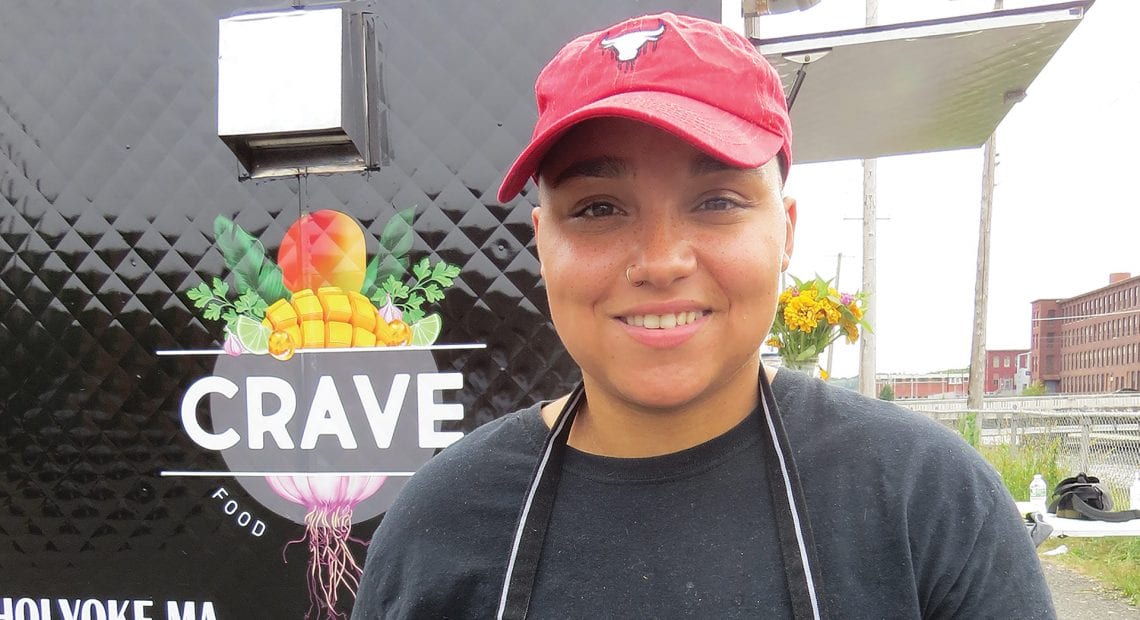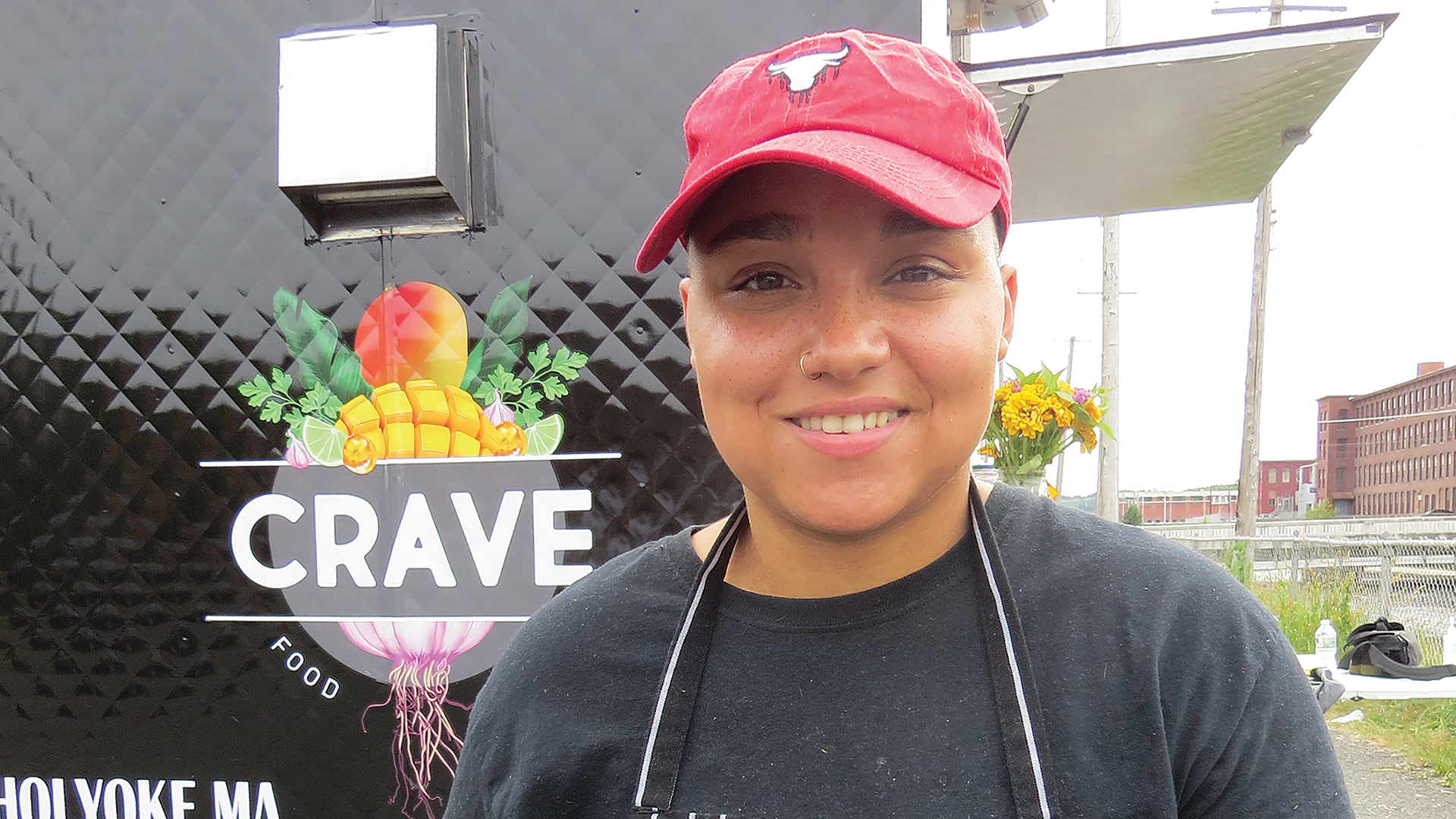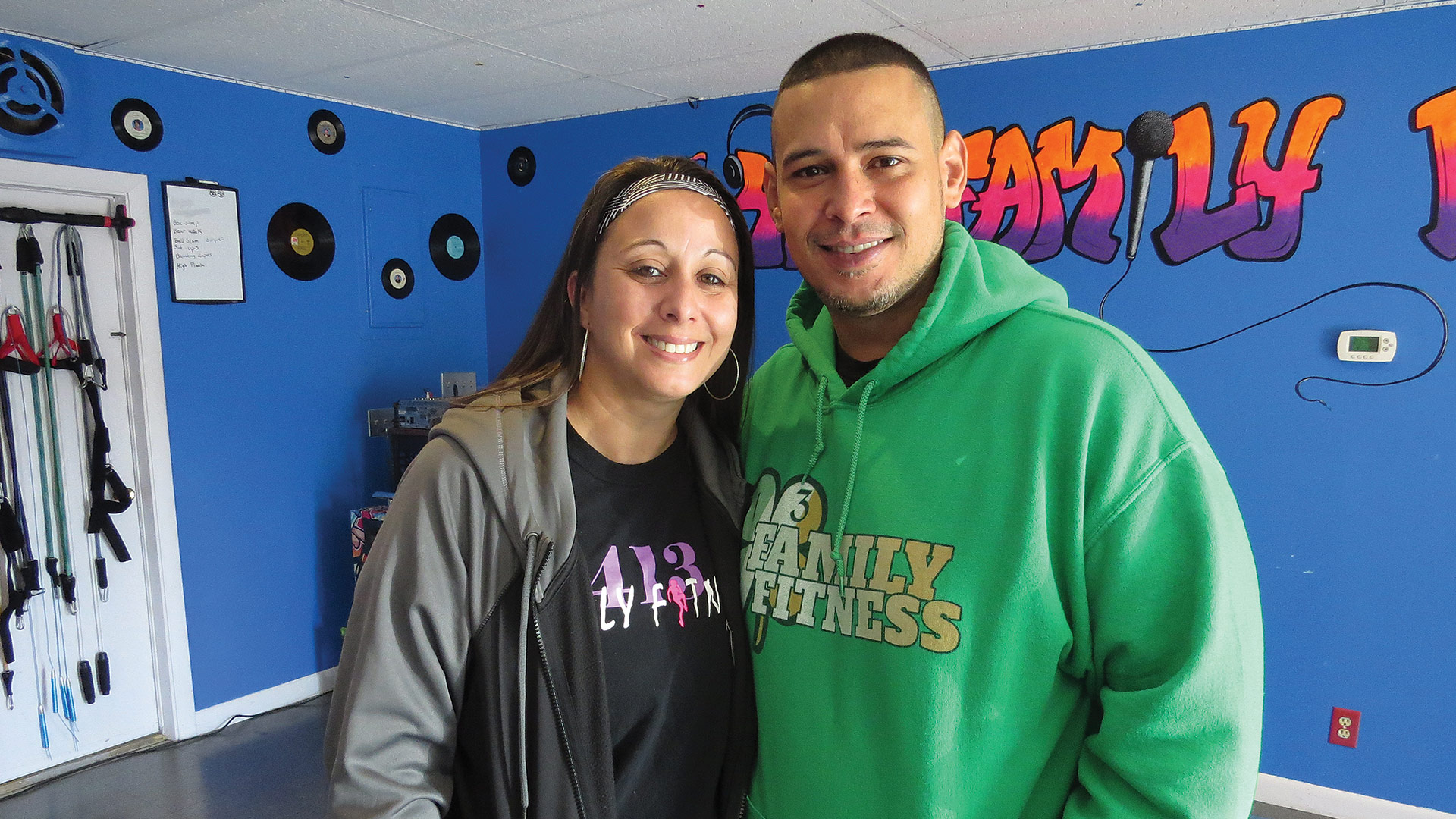
Ecosystem Helps Entrepreneurs Navigate the Pandemic
The Business of Pivoting

Nicole Ortiz, founder and president of Crave Food Truck
Nicole Ortiz remembers a lot of people having some serious doubts about whether she should go forward with her plans to put a food truck into operation late last spring.
After all, it was the middle of a pandemic, people were staying home, the economy was tanking, and the restaurant business, perhaps more than any other, was suffering mightily.
But Ortiz, a graduate of the Culinary Arts program at Holyoke Community College, was determined to make her dream, which she would call Crave, become reality — pandemic or not.
She had already acquired the vehicle itself, and her experience in the accelerator program operated by EforAll Holyoke had given her the confidence (and technical know-how) to get her show — a food truck specializing in Puerto Rican cuisine — on the road … literally.
Problem was, it was not business as usual when it came to securing the needed approvals and permits from city officials.
“It was even difficult to speak with officials from cities because people weren’t working as much, and you couldn’t even get into city halls,” she said. “Everything has to be mailed in, which takes … as long as that takes. Meanwhile, a lot of cities don’t have ways to do this online; you can’t e-mail them or submit a form online. You have to mail it in, and that took a while.”
But Ortiz persevered, and opened for business just over a month ago. Her truck, usually parked on Race Street, not far from the Cubit Building and just a few blocks from the computing center, is actually exceeding goals set higher than most everyone she knows thought were reasonable.
Successful launches in the middle of COVID-19 are certainly rare, and for most area entrepreneurs, especially those trying to get a concept off the ground or to the next level, these are challenging times, when the focus is on pivoting and adjusting to meet changing needs and changing ways of doing things.

Juan and Elsie Vasquez, owners of 413 Family Fitness, are like many small-business owners in that they have had to pivot during the pandemic and create new revenue streams.
In most all ways, the same can be said of the region’s entrepreneurship ecosystem itself, which specializes mostly on programs focused on people gathering in large numbers or sitting across a table from one another — things that can’t be done during a pandemic. Agencies within the ecosystem have been pivoting and adjusting as well.
This is especially true of Valley Venture Mentors (VVM), the nonprofit based in Springfield’s Innovation Center, which is in the midst of what interim Director Chris Bignelli, a partner with the Alchemy Fund, calls a ‘reset.’
That’s the word he chose to describe a retrenching after most of the agency’s staff members left within a week of each other last spring, and after COVID prevented it from staging any of the large gatherings for which it became known — not only here, but across the state and beyond.
“Our mentors advise entrepreneurs about the importance of pivoting and changing directions when needed, and we’re doing the same,” he said, adding that the pandemic and other forces are compelling the agency to look inward and find new and perhaps different ways to provide value to entrepreneurs while also providing support to other agencies and initiatives within the ecosystem.
“For a while there, it really felt like we were kind of providing therapy to small-business owners.”
As VVM resets and reinvents, though, work within the ecosystem goes on during these trying times — despite COVID, and in many cases in an effort to help business owners survive it.
People like Juan and Elsie Vasquez. They operate 413 Family Fitness in Holyoke, a business that, like most all gyms, was devastated by the pandemic. With help from those at EforAll Holyoke, the couple has pivoted to everything from outdoor classes to staging quinceañeras, or sweet-15 birthdays (a tradition among Hispanics), and leasing out their space to third parties (more on that later).
Meanwhile, another initiative within the ecosystem, WIT — Women Innovators and Trailblazers — is continuing its mentoring program despite COVID, and is preparing to embark on its third cohort of matches.

Leah Kent says the mentor she’s been matched with through the WIT program, Melissa Paciulli, has helped her set firm goals for her business and move out of her comfort zone.
The second cohort, featuring 45 teams, up from 20 in the first, was started just before the pandemic shut things down, noted Ann Burke, vice president of the the Economic Development Council of Western Massachusetts and one of the architects of the program, adding that she had some concerns about whether those matches could withstand COVID and its highly disruptive nature.
But for the most part, the partnerships persevered, and many have the legs to continue even after the formal program is over.
“We were really trying to see what would happen with the cohort and how they would respond with all that was happening,” said Burke. “I thought most of them would just throw up their hands and say, ‘we can’t do this’ amid all the business issues, personal issues, and issues at home. But for the most part, that’s not what happened.”
For this issue, BusinessWest takes an in-depth look at the local entrepreneurship ecosystem and how it is carrying on through the pandemic, providing more evidence of its importance to the region.
Keep on Trucking
Flashing back several months and then fast-forwarding to today, Ortiz described the process of opening with a single word — ‘crazy.’
That sentiment applied to everything from getting her truck outfitted for the road — meaning wrapped with her logo and fully equipped — to buying all the supplies she needed (which meant going to the grocery store a number of times), to getting those aforementioned permits and approvals. Work started later than she wanted, and everything was made more difficult by the pandemic.
“Most of March and half of April, I called a halt to everything,” she said, noting that she bought the truck in February, but, because of the pandemic — and also the fact that she was still in school, which was also more complicated — she wasn’t able to advance her plans. “And then I started to feel more comfortable, and by the end of the April, I was going full speed.”
Or at least the speed at which City Hall would allow her to travel.
Now that she’s open, all that craziness seems like a distant memory, and business is, as she noted, exceeding expectations.
“We’ve been busy every day, and we usually sell out by the end of the day,” she said, noting that Craze features tacos, rice bowls, vegetarian and vegan dishes, and more, and uses social media to connect with potential customers. “COVID might actually be helping because people don’t want to go to restaurants.”
She credits EforAll — she was the first-place winner in its recent winter accelerator — with helping her get the doors open, especially with such matters as insurance and accounting, but also focusing on the model she wanted and the service she wanted to provide.
And such work is carrying on in the COVID-19 era, although it’s somewhat different and also in some ways more challenging, said Tessa Murphy-Romboletti, executive director of EforAll.
“We’ve been really fortunate that we can continue to offer a lot of the services that we provided before the pandemic in a virtual format,” she explained. “And we made that pivot very quickly, out of necessity.”
Elaborating, she said the agency was in the final stages of its winter cohort when the pandemic hit, and quickly shifted to not only a virtual platform, but a somewhat different purpose as it helped both those cohort members and other small businesses cope with everything that was happening.
“For a while there, it really felt like we were kind of providing therapy to small-business owners,” she explained. “We felt like there were a lot of things out of our control, but what we did want to do was support them, whether it was with help navigating PPP loans or even just applying for unemployment. We were doing a lot of one-on-one support and just helping people however we could.”
“It gives people a place to come and brainstorm as a group and impose that accountability that can sometimes be missing when you’re running your own venture.”
And such help was certainly needed, she said, adding that, in the case of PPP, many small businesses didn’t know if they were eligible, and if they were, they certainly needed assistance with paperwork that most established businesses turned over to a seasoned accountant. Meanwhile, a number of local, state, and federal grant programs emerged, and small businesses needed help identifying which ones might be appropriate and then navigating the application process.
Beyond that, EforAll also helped some businesses identify ways to pivot and find new revenue streams in the middle of a pandemic, Murphy-Romboletti said, adding that such assistance was provided to restaurants — helping them move beyond takeout and Grubhub, for example — and to other kinds of ventures, like 413 Family Fitness, which is one of those businesses that just ‘graduated’ from the most recent accelerator.
Like all fitness centers across the state, this operation had to shut down back in the spring, said Elsie Vasquez, forcing the company to pivot. It did so by offering classes online, then a shift to outdoor classes, more one-on-one personal training, and finally a reopening of the studio in July, with a host of restrictions.
“We’ve even done some space rental to bring in some revenue,” she told BusinessWest, adding that EforAll has been invaluable in helping to not only identify ways to generate business, but make them reality.
“The biggest thing we learned is that we have to pivot our business,” she explained. “We came in with an idea of what we wanted to do, and it’s been working out OK, but EforAll really opened our eyes to the fact that we have to think differently, and that your beginning result may not be your end result.”
In Good Company
While companies are pivoting, so too are some of the agencies within the ecosystem that serves them. And VVM is probably the best example.
Hope Gibaldi, who was serving the agency in a part-time role when the pandemic hit and is now full-time, serving as engagement manager, told BusinessWest that the agency has had to readjust as a result of the pandemic and its inability to stage the large gatherings it became known for.
Meanwhile, is doing what its mentors advise entrepreneurs to do — assess needs within the community and go about meeting them.
“There were listening sessions prior to the pandemic,” she noted, “and we’ve been taking the priorities identified during those sessions with an eye toward addressing them, while also trying to figure out how we can continue to provide value to entrepreneurs during COVID and what programming might look like when we come out of COVID.”
Elaborating, she said hybrid models blending in-person and remote programming are being considered, while, in the meantime, the agency is creating ways to bring people together on a remote basis to share ideas and work through common problems.
One such program is the introduction — or reintroduction, to be more precise — of ‘Entrepreneurial Roundtables,’ a peer-led “accountability group,” as she called it, that meets via Zoom.
“It’s a place where mentors and entrepreneurs can come and address their challenges,” Gibaldi explained. “It gives people a place to come and brainstorm as a group and impose that accountability that can sometimes be missing when you’re running your own venture.”
Other initiatives already in place or in the planning stages, she said, include everything from the agency’s once-thriving Community Nights (now handled remotely) to expert-in-industry mentorship, to a book club, to be launched in January, focusing on offerings in entrepreneurship, marketing, personal and professional growth, and more.
Overall, VVM looks a little different, but its mission hasn’t changed, Gibaldi said, adding that it is working to partner with other agencies and initiatives within the ecosystem to help them succeed.
One example is WIT, and helping to recruit mentors for that program, which has thus far created dozens of effective matches.
Leah Kent and Melissa Paciulli comprise one such match. The former is a writer and book designer who also helps other writers with the process of getting published, while the latter is director of the STEM Starter Academy at Holyoke Community College. Kent described the relationship as an intriguing, and effective, collision of science and creativity.
“We can understand each other quite well, but we bring different strengths,” she explained. “That complementary pairing has been so fantastic. In my work, she’s really honed in on the way that I help readers finish their manuscripts and get their work published.”
The two were part of the cohort that launched last March; the kickoff gathering was on March 12, and the next day, schools were shut down, and much of the business world ground to a halt. Kent’s original mentor was not able to continue participating because of the pandemic, so she was reassigned, if that’s the right word, to Paciulli, whom she credits with taking her outside her comfort zone and helping her set the bar higher professionally and personally.
Paciulli said Kent is her second match through WIT, and one of many business owners and students she has mentored over the years. She finds the work invigorating and rewarding, especially when the mentee is coachable and open-minded — like Kent.
“When you’re working with entrepreneurs and they’re coachable, and they take action on your direction, because it’s an iterative process of finding your product, getting it to market, and pivoting when you need to … it’s a super-cool experience to be part of one’s journey in that way,” she said. “When they’re coachable and they’re action-oriented — and she is — it’s awesome.”
Where There’s a Will…
Summing up what the past seven months or so have been like for entrepreneurs and small businesses, Murphy-Romboletti said it’s been a continuous run of challenges that have tested them — and her agency — in every way imaginable.
In many ways, COVID-19 and everything it has thrown at these businesses only reinforces what she pretty much already knew.
“What always inspires me about entrepreneurs is that, if you tell them ‘no,’ they just say, ‘OK, let me find out a way to make this work,’” she said.
Many have been doing just that, providing more evidence of their resiliency and more reminders of the importance of the entrepreneurship ecosystem to this region and its future.
The pandemic has slowed some things down and added to the already-long list of hurdles entrepreneurs have to clear, but it certainly hasn’t stopped people like Nicole Ortiz — and countless others — from getting down to business.
George O’Brien can be reached at [email protected]






